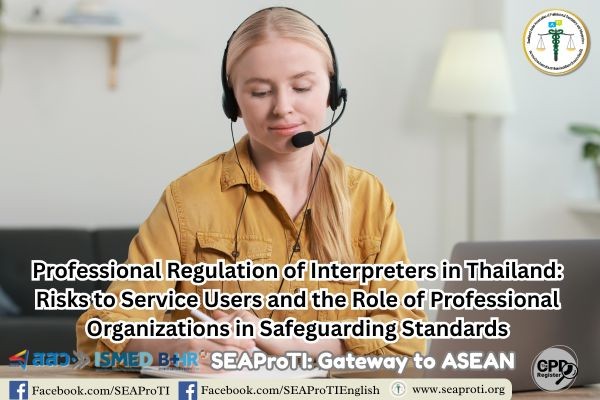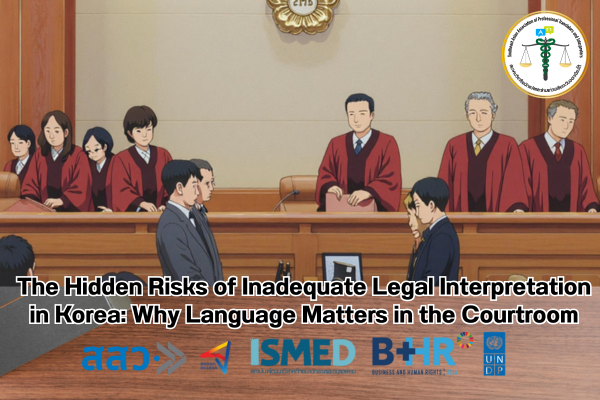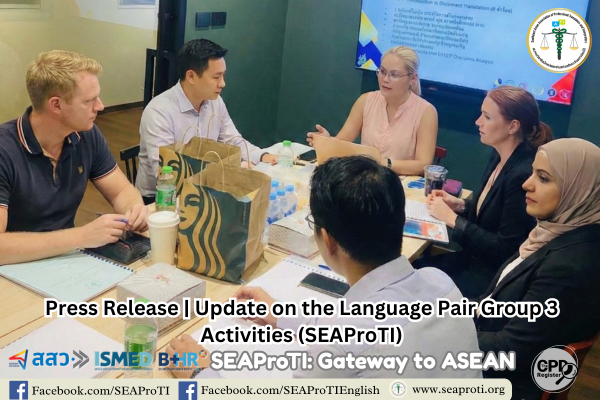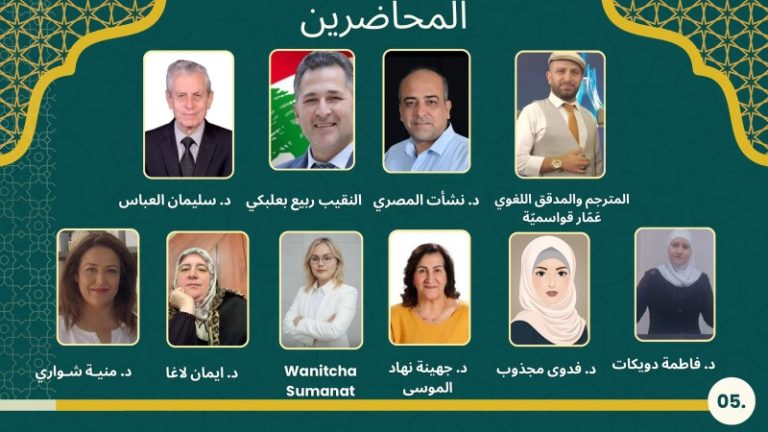Professional Regulation of Interpreters in Thailand:
Risks to Service Users and the Role of Professional Organizations in Safeguarding Standards
22 November 2025, Bangkok — Interpreting is a profession that plays a critically important role in the justice system, healthcare, diplomacy, international business, and various public services. The accuracy of an interpreter’s message transfer directly affects the rights, duties, and interests of individuals and organizations involved. However, in the context of Thailand, the system for interpreter registration and professional regulation still lacks a unified national standard. As a result, the quality and accountability of professional practice vary significantly from one individual to another.
This article aims to analyze the risks faced by employers and service users who engage interpreters operating outside a formal professional regulatory system, as well as to examine the role of professional organizations—specifically the Southeast Asian Professional Translators and Interpreters Association (SEAProTI)—in enhancing standards and protecting service users through ethical and disciplinary mechanisms.
1. The Current State of Interpreter Registration in Thailand
At present, the Thai administrative system does not impose a mandatory interpreter registration scheme similar to those in countries such as the United Kingdom or Australia, where a central authority formally regulates the profession (Pöchhacker, 2016). In Thailand, the only organization that formally registers language professionals based on professional criteria is the Southeast Asian Professional Translators and Interpreters Association (SEAProTI). Consequently, the practice of interpreting in Thailand remains largely unregulated, and individuals may declare themselves “interpreters” without undergoing certification, accreditation, or professional assessment by a central authority or professional body.
Although some government agencies offer interpreter training programs for specific purposes, such as court interpreting or community interpreting, these initiatives do not constitute a continuous professional regulatory framework. Furthermore, there is no official monitoring system or formal disciplinary mechanism for ethical misconduct (Hale, 2014). As such, interpreters trained by government agencies alone cannot necessarily be considered “professional interpreters” in the international sense, as they are not operating under the oversight of a recognized professional regulatory body.
This situation exposes service users to significant risks, particularly when engaging interpreters who lack sufficient qualifications, ethical standards, or accountability to a governing organization.
2. Legal and Ethical Risks to Service Users
When service users engage interpreters who operate outside a professional regulatory framework, several risks may arise, including:
- Mistranslation or distortion of meaning, which may result in legal consequences or reputational damage for the client;
- Unjustified additional charges, due to the absence of standardized fee structures or professional guidelines;
- Breaches of confidentiality, with no enforceable ethical obligation through a professional institution;
- A lack of neutrality, particularly in sensitive contexts such as court proceedings, mediation, or formal investigations.
While affected parties may pursue legal action under civil or criminal law, such procedures are often time-consuming, costly, and reactive rather than preventive (Mikkelson & Jourdenais, 2015). Sole reliance on the legal system, therefore, is insufficient for systematic protection. What is needed is a professional mechanism that continuously regulates conduct and enforces standards.
3. The Importance of Contracts in Interpreter Engagement
In the absence of a mandatory national registration system, contracts serve as the primary legal instrument for protecting service users.
An interpreter contract should clearly define:
- The scope and nature of the interpreting task
- The language pair and interpreting mode required (e.g., consecutive, whispering, simultaneous)
- The date, time, location, and duration of service
- The fee structure and terms of payment
- Cancellation conditions and liability clauses
- Confidentiality and impartiality requirements
- A dispute resolution mechanism
The fundamental principle is that any matter not explicitly covered by law must be clearly stipulated in the contract in order to minimize ambiguity and provide legal protection in the event of a dispute (Chesterman & Wagner, 2014).
4. The Role of SEAProTI in Professional Regulation
The Southeast Asian Professional Translators and Interpreters Association (SEAProTI) serves as a professional regulatory mechanism for enhancing standards within the language services industry in the region. Its principal functions include:
- A rigorous screening and eligibility verification process for membership, including the absence of a criminal record, bankruptcy, or legal incompetency;
- The establishment of a binding Code of Ethics, which every member must formally agree to uphold;
- A complaints-handling and disciplinary investigation mechanism. Any suspected breach of professional ethics may be reported to ethics@seaproti.com for formal review;
- A requirement for Continuing Professional Development (CPD) through training and evaluation;
- The provision of recommended minimum fees and professional performance standards.
In cases of confirmed misconduct, SEAProTI holds the authority to issue disciplinary actions, including formal warnings, suspension of membership, or revocation of professional certification. These professional sanctions exist in addition to any civil or criminal liability under Thai law.
Therefore, engaging interpreters who operate under the governance of SEAProTI provides an additional level of professional assurance in terms of quality, ethics, and accountability.
5. Conclusion
As Thailand continues to lack a nationally enforced interpreter registration system, the risks associated with unregulated practice remain significant. Reliance on civil and criminal law alone is insufficient to prevent systemic harm.
The combination of a well-drafted service contract and the selection of interpreters who are subject to professional oversight, such as those accredited by SEAProTI, represents a practical and effective strategy for risk mitigation. In the long term, this approach contributes to the professionalization and credibility of the interpreting profession in Thailand and the wider Southeast Asian region.
References
- Chesterman, A., & Wagner, E. (2014). Can theory help translators? A dialogue between the ivory tower and the wordface (2nd ed.). Routledge.
- Hale, S. B. (2014). The discourse of court interpreting. John Benjamins Publishing Company.
- Mikkelson, H., & Jourdenais, R. (2015). The Routledge handbook of interpreting. Routledge.
- Pöchhacker, F. (2016). Introducing interpreting studies (2nd ed.). Routledge.
About Certified Translators, Translation Certifiers, and Certified Interpreters of SEAProTI
The Southeast Asian Association of Professional Translators and Interpreters (SEAProTI) has formally announced the qualifications and requirements for registration of Certified Translators, Translation Certification Providers, and Certified Interpreters in Sections 9 and 10 of the Royal Gazette, published by the Secretariat of the Cabinet, Office of the Prime Minister of Thailand, on 25 July 2024 (Vol. 141, Part 66 Ng, p. 100). Certified Translators, Translation Certification Providers, and Certified Interpreters
The Council of State has proposed the enactment of a Royal Decree, granting registered translators and recognized translation certifiers from professional associations or accredited language institutions the authority to provide legally valid translation certification (Letter to SEAProTI dated April 28, 2025)
SEAProTI is the first professional association in Thailand and Southeast Asia to implement a comprehensive certification system for translators, certifiers, and interpreters.
Head Office: Baan Ratchakru Building, No. 33, Room 402, Soi Phahonyothin 5, Phahonyothin Road, Phaya Thai District, Bangkok 10400, Thailand
Email: hello@seaproti.com | Tel.: (+66) 2-114-3128 (Office hours: Mon–Fri, 09:00–17:00)
การกำกับดูแลวิชาชีพล่ามในประเทศไทย กับความเสี่ยงของผู้ใช้บริการ และบทบาทขององค์กรวิชาชีพในการคุ้มครองมาตรฐาน
22 พฤศจิกายน 2568, กรุงเทพมหานคร – ล่ามเป็นหนึ่งในวิชาชีพที่มีบทบาทสำคัญอย่างยิ่งในกระบวนการยุติธรรม การแพทย์ การทูต ธุรกิจระหว่างประเทศ และการบริการสาธารณะอื่น ๆ ความถูกต้องของการถ่ายทอดสารโดยล่ามมีผลโดยตรงต่อสิทธิ หน้าที่ และผลประโยชน์ของบุคคลและองค์กรที่เกี่ยวข้อง อย่างไรก็ตาม ในบริบทของประเทศไทย ระบบการขึ้นทะเบียนและการกำกับดูแลล่ามยังคงขาดมาตรฐานที่เป็นหนึ่งเดียวในระดับประเทศ ส่งผลให้คุณภาพและความรับผิดชอบในการประกอบวิชาชีพแตกต่างกันอย่างมากในแต่ละบุคคล
บทความนี้มุ่งวิเคราะห์ความเสี่ยงที่ผู้ว่าจ้างและผู้ใช้บริการอาจเผชิญจากการว่าจ้างล่ามที่อยู่นอกระบบกำกับดูแลทางวิชาชีพ ตลอดจนบทบาทขององค์กรวิชาชีพ ได้แก่ สมาคมวิชาชีพนักแปลและล่ามแห่งเอเชียตะวันออกเฉียงใต้ (SEAProTI) ในการยกระดับมาตรฐานและคุ้มครองผู้ใช้บริการผ่านกลไกทางจริยธรรมและระเบียบวินัย
1. สภาพปัจจุบันของการขึ้นทะเบียนล่ามในประเทศไทย
ในปัจจุบัน ระบบราชการไทยยังไม่มีระบบบังคับขึ้นทะเบียนล่ามในลักษณะเดียวกับบางประเทศ เช่น สหราชอาณาจักรหรือออสเตรเลีย ที่มีหน่วยงานกลางรับรองวิชาชีพอย่างเป็นทางการ (Pöchhacker, 2016) ซึ่งทีเพียงสมาคมวิชาชีพนักแปลและล่ามแห่งเอเชียตะวันออกเฉียงใต้ (SEAProTI) ในประเทศไทย ที่รับขึ้นทะเบียนนักวิชาชีพโดยจะต้องเป็นไปตามเกณฑ์ของสมาคม ดังนั้น ในประเทศไทย การประกอบวิชาชีพล่ามในประเทศไทยจึงเปิดเสรี บุคคลทั่วไปสามารถประกาศตนเป็น “ล่าม” ได้โดยไม่ต้องผ่านการรับรองหรือการตรวจสอบมาตรฐานจากหน่วยงานกลาง หรือหน่วยงานวิชาชีพใด ๆ
แม้ว่าจะมีหน่วยงานของรัฐบางแห่งเปิดอบรมล่ามสำหรับการใช้งานเฉพาะด้าน เช่น ล่ามในกระบวนการยุติธรรม หรือล่ามชุมชน แต่การอบรมดังกล่าวยังไม่สามารถถือเป็นระบบกำกับดูแลวิชาชีพอย่างต่อเนื่อง และไม่มีระบบติดตามหรือบทลงโทษเมื่อมีการกระทำผิดจรรยาบรรณอย่างเป็นทางการ (Hale, 2014) ดังนั้น ล่ามเหล่านี้ จึงไม่ใช่ “ล่ามวิชาชีพ” เพราะไม่ได้อยู่ภายใต้การกำกับดูแลของหน่วยงานกลางหรือหน่วยงานวิชาชีพใด
ภาวะดังกล่าวส่งผลให้ผู้ใช้บริการจำนวนมากเผชิญกับความเสี่ยงจากการว่าจ้างล่ามที่ไม่มีคุณสมบัติเพียงพอ ไม่มีมาตรฐานด้านจริยธรรม และไม่มีองค์กรกลางกำกับดูแลประพฤติกรรมทางวิชาชีพ
2. ความเสี่ยงทางกฎหมายและจริยธรรมของผู้ใช้บริการ
เมื่อผู้ใช้บริการว่าจ้างล่ามนอกระบบกำกับดูแล ความเสี่ยงที่อาจเกิดขึ้น ได้แก่
- การแปลคลาดเคลื่อนหรือบิดเบือนสาร ซึ่งอาจนำไปสู่ความเสียหายทางกฎหมายหรือชื่อเสียงของผู้ใช้บริการ
- การเรียกเก็บค่าบริการเพิ่มเติมโดยไม่มีข้อตกลงล่วงหน้า เนื่องจากไม่มีมาตรฐานอัตราค่าบริการหรือแนวปฏิบัติที่ชัดเจน
- การละเมิดความลับของข้อมูล โดยไม่มีพันธกรณีทางจริยธรรมที่สามารถบังคับใช้ได้ผ่านองค์กรวิชาชีพ
- การปฏิบัติงานที่ไม่เป็นกลาง โดยเฉพาะในบริบทการพิจารณาคดี การไกล่เกลี่ย หรือการสอบสวน
ในกรณีที่เกิดความเสียหาย ผู้เสียหายโดยทั่วไปสามารถดำเนินคดีตามกฎหมายแพ่งหรืออาญาได้ แต่กระบวนการดังกล่าวมักใช้เวลานาน มีค่าใช้จ่ายสูง และไม่ได้ช่วยป้องกันเหตุการณ์ในอนาคตได้อย่างเป็นระบบ (Mikkelson & Jourdenais, 2015)
ดังนั้น การใช้กฎหมายเพียงอย่างเดียวจึงไม่เพียงพอสำหรับการคุ้มครองผู้ใช้บริการ จำเป็นต้องมี “กลไกทางวิชาชีพ” เข้ามาเสริมสร้างมาตรฐานและควบคุมพฤติกรรมของผู้ประกอบวิชาชีพอย่างต่อเนื่อง
ภายใต้บริบทที่ยังไม่มีระบบขึ้นทะเบียนภาคบังคับ สัญญาจ้างจึงกลายเป็นเครื่องมือทางกฎหมายที่สำคัญที่สุดในการคุ้มครองผู้ใช้บริการล่าม
สัญญาจ้างล่ามควรกำหนดสาระสำคัญอย่างชัดเจน ได้แก่
- ขอบเขตและลักษณะงานล่าม
- ภาษาและรูปแบบการล่ามที่ต้องการ (เช่น ล่ามพูดตาม ล่ามกระซิบ ล่ามพูดพร้อม)
- วัน เวลา สถานที่ และระยะเวลาการปฏิบัติงาน
- อัตราค่าตอบแทนและเงื่อนไขการชำระเงิน
- เงื่อนไขการยกเลิกงานและความรับผิด
- ข้อกำหนดด้านความลับและความเป็นกลาง
- แนวทางการระงับข้อพิพาท
4. บทบาทของ SEAProTI ในการกำกับดูแลวิชาชีพล่าม
สมาคมวิชาชีพนักแปลและล่ามแห่งเอเชียตะวันออกเฉียงใต้ (SEAProTI) ทำหน้าที่เป็นกลไกทางวิชาชีพสำหรับการยกระดับมาตรฐานของนักแปลและล่ามในภูมิภาค โดยมีแนวทางสำคัญดังนี้:
- ระบบคัดกรองและตรวจสอบคุณสมบัติของสมาชิกที่เข้มงวด ได้แก่ ไม่มีประวัติอาชญากรรม ไม่เป็นบุคคลล้มละลาย และไม่เป็นบุคคลที่ไร้ความสามารถ
- การกำหนดจรรยาบรรณวิชาชีพ (Code of Ethics) ที่สมาชิกต้องปฏิบัติตาม ทุกคนจะต้องลงนามในสัญญาผูกพันว่าจะปฏิบัติตามจรรยาบรรณวิชาชพที่สมาคมกำหนด
- กลไกรับเรื่องร้องเรียนและการสอบสวนทางวินัย โดยหากผู้ใช้พบเห็นการละเมิดจรรยาบรรณวิชาชีพ ให้แจ้งมาได้ที่ ethics@seaproti.com เพื่อนำไปสู่การสืบสอบ
- การพัฒนาอย่างต่อเนื่อง (Continuing Professional Development: CPD) ผ่านการอบรมและประเมินผล
- การกำหนดแนวทางค่าตอบแทนขั้นต่ำและมาตรฐานวิชาชีพ
ดังนั้น การเลือกใช้ล่ามที่อยู่ภายใต้ SEAProTI จึงเป็น “หลักประกันในระดับวิชาชีพ” ที่ช่วยลดความเสี่ยงด้านคุณภาพ จริยธรรม และความน่าเชื่อถือของงานล่าม
5. บทสรุป
ในขณะที่ประเทศไทยยังคงขาดระบบบังคับขึ้นทะเบียนล่ามในระดับประเทศ ความเสี่ยงในการใช้บริการล่ามที่อยู่นอกระบบกำกับดูแลยังคงดำรงอยู่ การพึ่งพาเพียงกฎหมายแพ่งและอาญาไม่เพียงพอต่อการป้องกันความเสียหายในเชิงระบบ
เอกสารอ้างอิง (References – APA Style)
- Chesterman, A., & Wagner, E. (2014). Can theory help translators? A dialogue between the ivory tower and the wordface (2nd ed.). Routledge.
- Hale, S. B. (2014). The discourse of court interpreting. John Benjamins Publishing Company.
- Mikkelson, H., & Jourdenais, R. (2015). The Routledge handbook of interpreting. Routledge.
- Pöchhacker, F. (2016). Introducing interpreting studies (2nd ed.). Routledge.
สมาคมวิชาชีพนักแปลและล่ามแห่งเอเชียตะวันออกเฉียงใต้ (SEAProTI) ได้ประกาศหลักเกณฑ์และคุณสมบัติผู้ที่ขึ้นทะเบียนเป็น “นักแปลรับรอง (Certified Translators) และผู้รับรองการแปล (Translation Certification Providers) และล่ามรับรอง (Certified Interpreters)” ของสมาคม หมวดที่ 9 และหมวดที่ 10 ในราชกิจจานุเบกษา ของสำนักเลขาธิการคณะรัฐมนตรี ในสำนักนายกรัฐมนตรี แห่งราชอาณาจักรไทย ลงวันที่ 25 ก.ค. 2567 เล่มที่ 141 ตอนที่ 66 ง หน้า 100 อ่านฉบับเต็มได้ที่: นักแปลรับรอง ผู้รับรองการแปล และล่ามรับรอง
สำนักคณะกรรมการกฤษฎีกาเสนอให้ตราเป็นพระราชกฤษฎีกา โดยกำหนดให้นักแปลที่ขึ้นทะเบียน รวมถึงผู้รับรองการแปลจากสมาคมวิชาชีพหรือสถาบันสอนภาษาที่มีการอบรมและขึ้นทะเบียน สามารถรับรองคำแปหฟลได้ (จดหมายถึงสมาคม SEAProTI ลงวันที่ 28 เม.ย. 2568)
สมาคมวิชาชีพนักแปลและล่ามแห่งเอเชียตะวันออกเฉียงใต้ เป็นสมาคมวิชาชีพแห่งแรกในประเทศไทยและภูมิภาคเอเชียตะวันออกเฉียงใต้ที่มีระบบรับรองนักแปลรับรอง ผู้รับรองการแปล และล่ามรับรอง
สำนักงานใหญ่: อาคารบ้านราชครู เลขที่ 33 ห้อง 402 ซอยพหลโยธิน 5 ถนนพหลโยธิน แขวงพญาไท เขตพญาไท กรุงเทพมหานคร 10400 ประเทศไทย
อีเมล: hello@seaproti.com โทรศัพท์: (+66) 2-114-3128 (เวลาทำการ: วันจันทร์–วันศุกร์ เวลา 09.00–17.00 น.

























